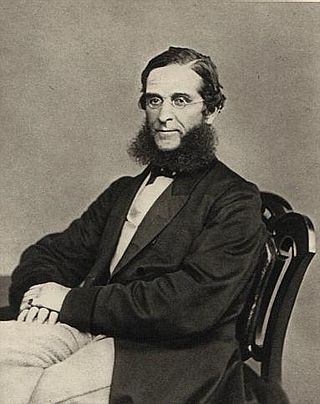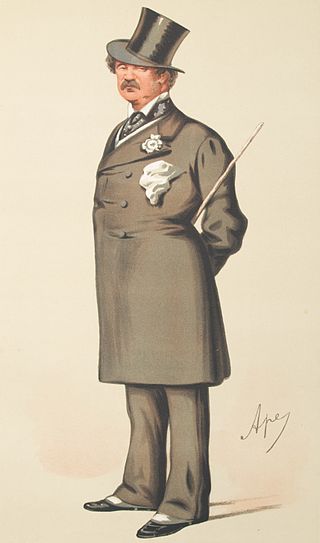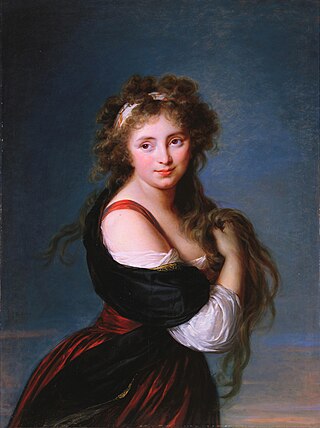Related Research Articles

Richard Colley Wellesley, 1st Marquess Wellesley, was an Anglo-Irish politician and colonial administrator. He was styled as Viscount Wellesley until 1781, when he succeeded his father as 2nd Earl of Mornington. In 1799, he was granted the Irish peerage title of Marquess Wellesley of Norragh. He was also Lord Wellesley in the Peerage of Great Britain.

Martin Lister was an English naturalist and physician. His daughters Anne and Susanna were two of his illustrators and engravers.

Sir John Evans was an English antiquarian, geologist and founder of prehistoric archaeology.

Francis Douce was a British antiquary and museum curator.

Garret Colley Wesley, 1st Earl of Mornington was an Anglo-Irish politician and composer, as well as the father of several distinguished military commanders and politicians of Great Britain and Ireland.

Lord Alfred Henry Paget was a British soldier, courtier and Liberal politician who sat in the House of Commons between 1837 and 1865.

William Nevill, 1st Marquess of Abergavenny, styled Viscount Neville between 1845 and 1868 and known as The Earl of Abergavenny between 1868 and 1876, was a British peer.

Broad Street is a wide street in central Oxford, England, just north of the former city wall. The street is known for its bookshops, including the original Blackwell's bookshop at number 50, located here due to the University of Oxford. Among residents, the street is traditionally known as The Broad.
Charles William Frederick Cavendish-Bentinck was a priest of the Church of England who held livings in Bedfordshire. He was also the maternal grandfather of Queen Elizabeth The Queen Mother, great-grandfather of Elizabeth II, and a great-great-grandfather of King Charles III.

Lady Charles Cavendish-Bentinck, known between 1806 and 1816 as Lady Abdy, was a British aristocrat and a great-great-grandmother of Queen Elizabeth II.

Charles Chetwynd Chetwynd-Talbot, 2nd Earl Talbot, KG, PC, FRS, styled Viscount of Ingestre between 1784 and 1793, was an English politician and peer. He served as Lord Lieutenant of Ireland between 1817 and 1821.

Alexander Munro was a British sculptor of the Pre-Raphaelite movement. He concentrated on portraiture and statues, but is best known for his Rossetti-influenced figure-group Paolo and Francesca (1852), which has often been identified as the epitome of Pre-Raphaelite sculpture.

Charles Buller Heberden was an English classical scholar and academic administrator. He was principal of Brasenose College, Oxford (1889–1920) and served as vice-chancellor of Oxford University.

John Arthur Ruskin Munro (1864–1944) was the Rector of Lincoln College, Oxford.
Richard Wellesley was an Anglo-Irish Member of Parliament.

Sarah Angelina "Angie" Acland was an English amateur photographer, known for her portraiture and as a pioneer of colour photography. She was credited by her contemporaries with inaugurating colour photography "as a process for the travelling amateur", by virtue of the photographs she took during two visits to Gibraltar in 1903 and 1904.

The following is a timeline of the history of the city, university and colleges of Oxford, England.

Hyacinthe-Gabrielle Wellesley, Countess of Mornington was a French actress who became the mistress, and later the wife, of Richard Wellesley, 1st Marquess Wellesley. As an actress, she was known as Gabrielle Fagan. Through her daughter, Anne, Roland was a great-great-great grandmother of Queen Elizabeth II.

Alexander Macdonald (1849–1921), sometimes erroneously written MacDonald, was a British artist and art educator.

John Shute Duncan LLD was an English academic, writer, and museum curator. He was Keeper (head) of the Ashmolean Museum at the University of Oxford.
References
- ↑ "Dr Rev Henry Wellesley (Biographical details)". British Museum . Retrieved 25 May 2018.
Son of Marquess Richard Wellesley (q.v.) a\nd Hyacinth Roland (q.v). Principal of New Inn Hall, Oxford, curator of the Bodleian Library, curator of Ashmolean Museum and Taylor Institute.
- 1 2 Alfred Webb (1878). "A Compendium of Irish Biography: Comprising Sketches of Distinguished Irishmen, and of Eminent Persons Connected with Ireland by Office Or by Their Writings". M.H. Gill & son . Retrieved 25 May 2018.
The Marquis left no legitimate children. His son Henry Wellesley, D.D. (born 1792; died 1866), Principal of New Inn Hall, Oxford, the author of several works, was a man of the most cultivated tastes; his knowledge of Spanish and Italian art and literature 'was supreme'.
- ↑ Foster, Joseph (1888–1892). . Alumni Oxonienses: the Members of the University of Oxford, 1715–1886 . Oxford: Parker and Co – via Wikisource.
- ↑ John McClintock; James Strong (1891). Cyclopædia of Biblical, Theological, and Ecclesiastical Literature, Volume 12. Harper & Brothers. p. 902. Retrieved 25 May 2018.
He was the author of Anthologica Polyglotta; or, A Selection of Versions in Various Languages, Chiefly from the Greek Anthology (1849);--and Stray Notes of Shakespeare (1865).